When Martin Bashir‘s notorious interview with the late Princess Diana aired 30 years ago, it was viewed by more than 20million people and hailed as a journalistic success.
It offered an unprecedented insight into the mental health of the Princess, her brief fling with Captain James Hewitt, alongside Prince Charles‘ affair with Camilla – issuing the famous line: ‘there were three of us in this marriage.’
The 54-minute interview served as the final nail in the coffin for the Wales’s relationship, with divorce papers filed less than a month later in light of guidance by the late Queen Elizabeth II.
Yet views on the 1995 interview have since changed – a 2021 inquiry into the intimate conversation by retired judge Lord Dyson, titled the Dyson Inquiry, revealed that Bashir had spun a great web of deceit in order to gain direct access to the Princess.
But even before such lies were exposed to the world, the interview was said to have had a detrimental impact on the Princess’ relationship with her beloved son, Prince William.
Writing in Battle of Brothers, Robert Lacey described how when William, then aged 13, watched the interview alone in his housemaster, Dr Andrew Bailey‘s office at Eton, he was later found ‘slumped on the sofa’ with his ‘eyes red with tears.’
Meanwhile, royal biographer Tina Brown revealed in her bestselling book Palace Papers that the late Queen Elizabeth II had even confided in a Palace source her fears that her beloved grandson ‘might have a nervous breakdown.’
The interview could not have come at a worse time for the young Prince, who was just two months into his first term at the prestigious school and described as ‘already in a fragile state’ following the momentous fallout of his parent’s separation.

Writing in Battle of Brothers, Robert Lacey described how when William, then aged 13, watched Princess Diana’s 1995 interview with Martin Bashir and was later found by his school housemaster ‘slumped on the sofa’ with his ‘eyes red with tears’
On the evening before the sensational interview was set to air, Dr Gailey had called the late Princess and urged her to speak to William in-person, insisting that it was ‘imperative’ he be prepared for the realities of the incoming broadcast.
‘Is that really necessary?,’ the late Princess had queried, according to royal expert Ingrid Seward.
Diana had previously travelled to William’s former school, Ludgrove, for ‘damage control’ purposes – desperately trying to to comfort the young prince and his brother, Prince Harry, following Charles’ devastating public admissions to Jonathan Dimbleby about the state of their marriage.
Ms Brown recalled how on October 17 1994, the pair were ‘summoned to the headmaster’s study for a meeting with Diana’ in desperate need for ‘answers’.
‘According to Andrew Morton, William, then twelve, asked her “Is it true, Mother? Is it true that Daddy never loved you?”.’
But in November 1995, it was Diana, rather than Charles, in the hotseat – with Dr Gailey calling the late Princess the next day, pleading that she make the journey to come and see her son in-person.
On November 19, William emerged from Eton’s iconic 15th-century chapel and when his mother called out to him, he met her eyes with a ‘sullen stare’.
Keeping his head down, the young Prince and Diana embarked on a ‘mission’ to have a private conversation about the sensational interview – with the pair said to have engaged in a short conversation behind a hedge in a desperate bid for privacy.
‘After a few more moments, he walked away from Diana, making no attempt to kiss her or say goodbye,’ paparazzo Mark Saunders, who had watched the interaction unfold, recalled.
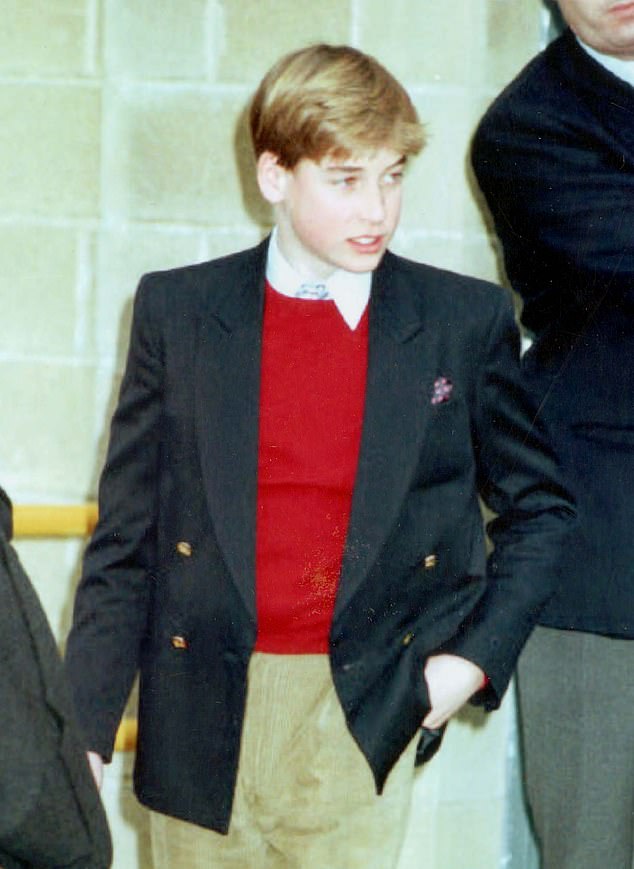
When the interview aired, he reportedly told a fellow classmate that as soon as he saw his mother’s face appear on screen he was ‘overcome with a feeling of dread’. An hour later when Diana telephoned on the school’s house phone, William refused to take her call
‘I watched in amazement as she got into the car and drove off, leaving a sad William watching from the doorway,’ he said.
Afterwards, she drove on to Ludgrove, Harry’s prep school based half an hour away, to deliver the same message to him.
Diana was said to have promised William during their brief conversation that the interview would make him ‘proud’, according to royal biographer Sally Bedell Smith writing in Charles: The Misunderstood Prince.
Yet, the reality was to be quite the contrary – with the young prince said to have been left ‘angry and incredulous’ in its aftermath, according to Penny Junor’s biography of William.
When the interview aired the following day, he reportedly told a fellow classmate that as soon as he saw his mother’s face appear on screen he was ‘overcome with a feeling of dread’, while his brother had ‘declined to watch the broadcast’ altogether.
A tearful William had managed to pull himself together to rush back to his room. But an hour later when Diana telephoned on the house phone, he refused to take her call.
Lacey explains further how Diana did not initially consider how the interview would impact her boys, with according to Simone Simmons, the Princess’s confidante and faith-healer, William was left particularly upset by ‘the idea of everything being on television.’
William likely felt particularly hurt by the extent of personal details revealed in the landmark interview – a far cry from the royal trend of ‘never complain, never explain’ that no doubt would have been instilled in the young prince from birth.
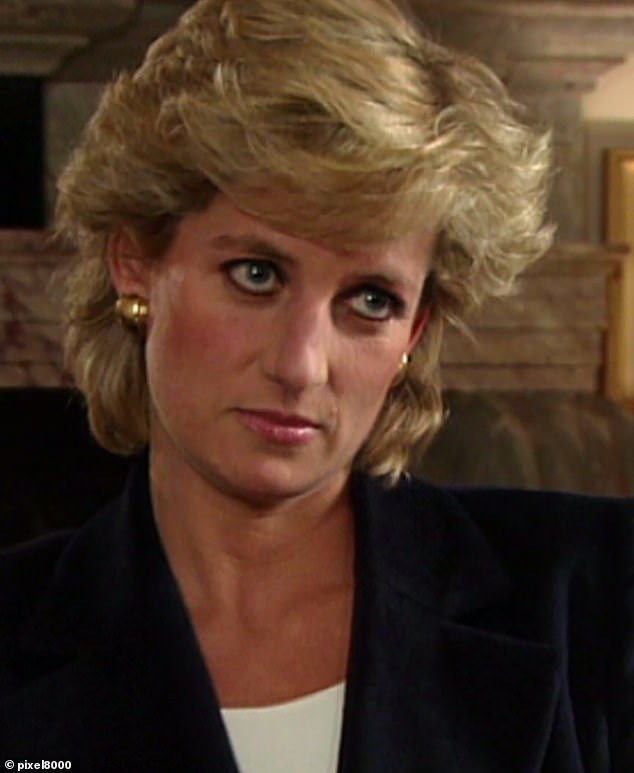
Lacey explains further how Diana did not initially consider how the interview would impact her boys, with according to Simone Simmons, the Princess’s confidante and faith-healer, William left particularly upset by ‘the idea of everything being on television’
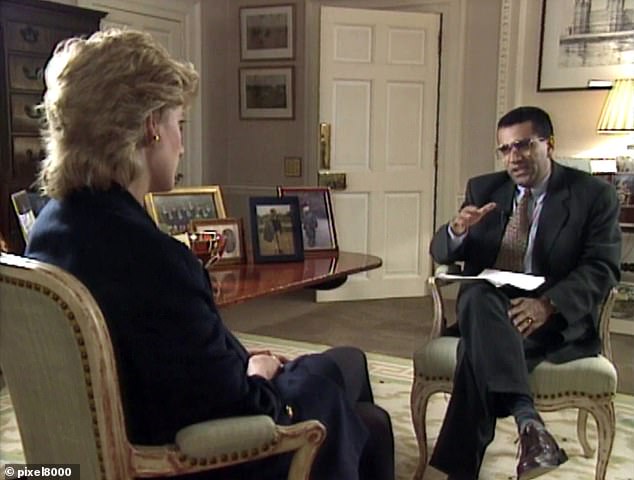
When the young prince returned home to Kensington Palace on the Saturday following the broadcast, he was ‘so angry’ with his mother. ‘All hell broke loose. He started shouting and crying and, when she tried to put her arms around him, he shoved her away,’ said Simmons
The late Princess shared the impact of the release of Anne Pasternak’s tell-all book Princess in Love, based upon 64 of Diana’s love letters to Captain James Hewitt, William and Harry’s riding instructor.
Following the book’s release, William was said to have produced a box of chocolates with the words, ‘Mummy, I think you’ve been hurt These are able to make you smile again.’
And the 13-year-old boy was also likely ill-prepared for his mother to go on national television and say ‘Yes, I adored him. Yes, I was in love with him’ about her extramarital boyfriend.
‘He knew his friends would poke fun at him, which they did. He felt she made a fool of herself – and of him,’ said Simmons.
He felt a mixture of humiliation and fury that she had denigrated his father and had mentioned Hewitt.
When the young prince returned home to Kensington Palace on the Saturday following the broadcast, he was ‘so angry’ with his mother, a ‘still weeping and distraught’ Diana had revealed to Simmons.
‘All hell broke loose. He was furious… that she had spoken badly of his father, furious that she had mentioned Hewitt… He started shouting and crying and, when she tried to put her arms around him, he shoved her away.’
While the following day William had apologised to his mother and presented her with flowers as a token of his apology, Diana was still convinced that the interview had irreversibly tainted their relationship.
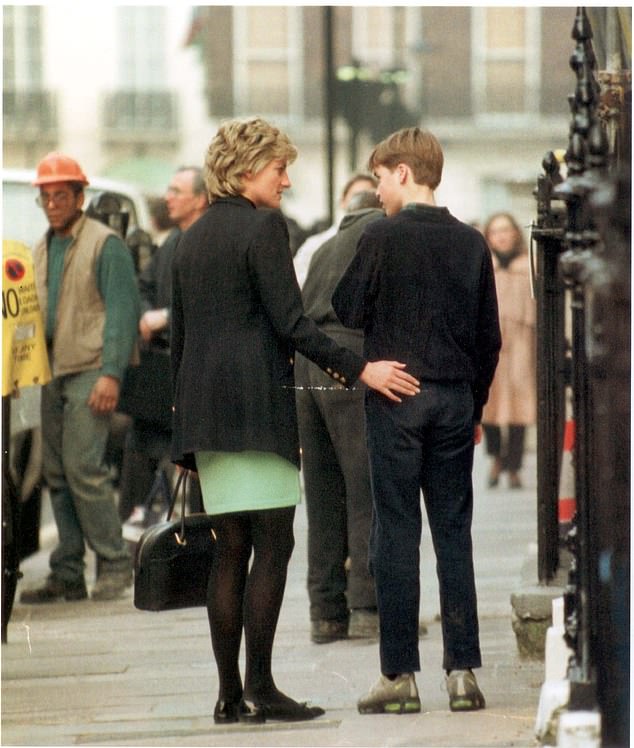
While the following day William had apologised to his mother and presented her with flowers as a token of his apology, Diana was still convinced that the interview had irreversibly tainted their relationship. She tearfully asked Ms Simmons: ‘What have I done to my children?’
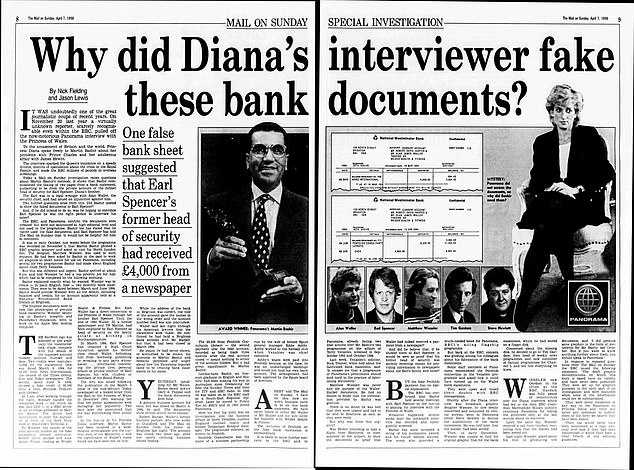
A 2021 inquiry into the intimate conversation by retired judge Lord Dyson, titled the Dyson Inquiry, revealed that Bashir had spun a great web of deceit in order to gain direct access to the Princess. Both William and Harry received ‘unconditional apology’ letters from the BBC
She tearfully asked Ms Simmons: ‘What have I done to my children?’
In the years that followed the interview, the inquiry revealed the true extent of deceit by Bashir – with the former BBC journalist found to have showed Earl Charles Spencer forged bank statements that falsely suggested individuals were being paid to keep the Princess under surveillance.
Alarmed, Charles introduced the journalist to his sister Diana.
Bashir was also found to have intentionally played on Diana’s paranoia ‘that she was being spied on’ by telling her that she was being watched by MI6. He even presented her with a so-called ‘abortion receipt’ suggesting that Charles and the royal nanny, Tiggy Legge-Bourke, had an affair.
Although Bashir eventually admitted that he had shown Charles Spencer the forged bank statements thanks to the work of journalists at the Daily Mail and The Sunday Times, he maintained that Diana did not see them.
In her own words, Diana assured the BBC: ‘Martin Bashir did not show me any documents, not give me any information that I was not previously aware of.
‘I consented to the interview on Panorama without any undue pressure and have no regrets concerning the matter.’ The word ‘no’ was underlined, as was her name.
Ms Brown, who was a close confidante of Diana, also firmly believes that the princess had ‘no regrets’ about the interview – despite it casting a long shadow over her sons.

William seems to have been unable to forgive the BBC for its behaviour over the Bashir saga, with the scars from his childhood staying firmly with him. In 2021, he issued a grave address on camera where he could not quite hide the fury that still haunted him
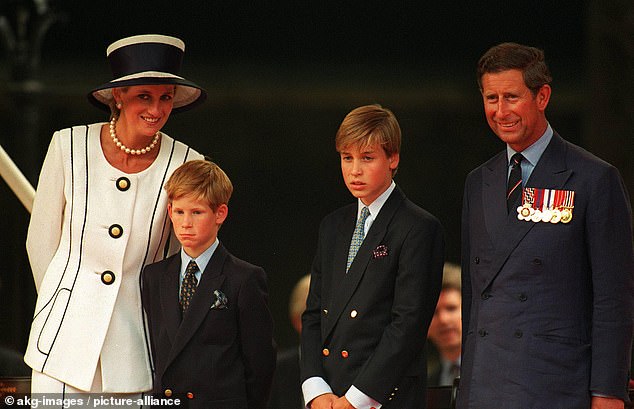
The 54-minute interview was the final nail in the coffin for the Wales’s relationship, with divorce papers filed less than a month later following guidance by the late Queen. Revealing Charles’ affair with Camilla, she issued the famous line: ‘there were three of us in this marriage’
Certainly William seems to have been unable to forgive the BBC for its behaviour over the Bashir saga, with the scars from his childhood staying firmly with him. In 2021, he issued a grave address on camera where he could not quite hide the fury that still haunted him.
Following the enquiries findings, which he described as ‘extremely concerning’, the prince said: ‘It is my view that the deceitful way the interview was obtained substantially influenced what my mother said.
‘It brings indescrible sadness to know that the BBC’s failures contributed significantly to her fear, paranoia and isolation that I remember from those final years with her.’
Revealing his firm feelings towards the interview, he concluded: ‘This Panorama programme holds no legitimacy and should never be aired again. It effectively established a false narrative which, for over a quarter of a century, has been commercialised by the BBC and others.
‘These failings not only let my mother down and my family down; they let the public down, too.’
Prince Harry added: ‘The ripple effect of a culture of exploitation and unethical practices ultimately took her life.’
Meanwhile, Diana’s brother, Charles Spencer, expressed his outrage at the institution’s ‘sheer dishonesty’ in a devastating letter in 2020 – accusing Mr Bashir of ‘yellow journalism’.
Mr Bashir apologised for the forged documents, stating ‘it was a stupid thing to do and was an action I deeply regret’, but insisted that ‘the bank statements had no bearing whatsoever on the personal choice by Princess Diana to take part in the interview’. He resigned from the BBC in May 2021, citing health reasons.
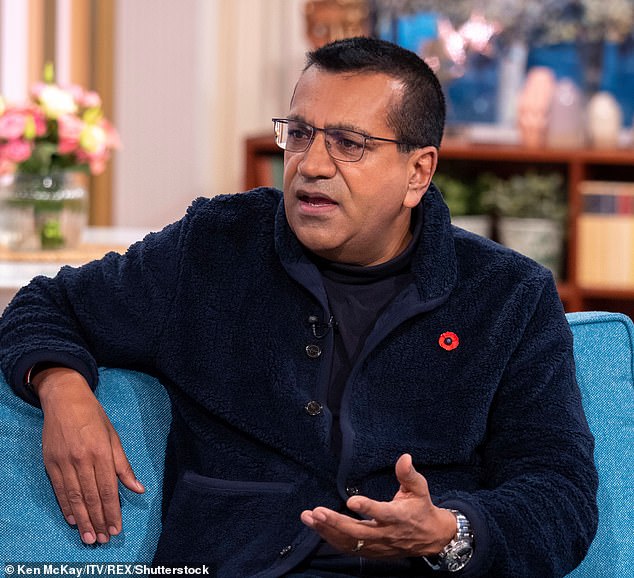
The former BBC journalist showed Earl Charles Spencer forged bank statements and intentionally played on Diana’s paranoia ‘that she was being spied on’ by telling her that she was being watched by MI6. He even presented her with a so-called ‘abortion receipt’
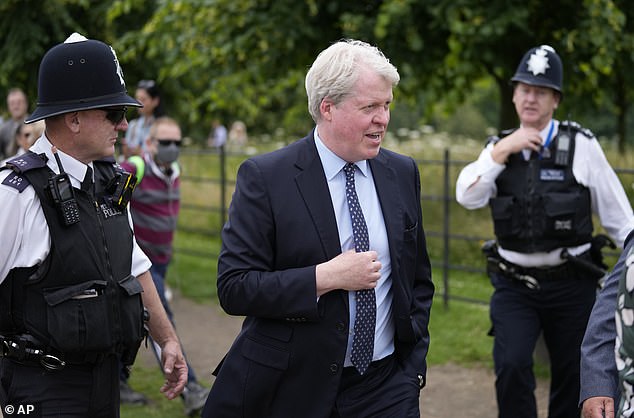
Diana’s brother, Charles Spencer, had introduced the princess to Bashir. In 2020, he expressed his outrage at the BBC’s ‘sheer dishonesty’ in a devastating letter and accused Mr Bashir of ‘yellow journalism’
In 2022, the BBC paid about £200,000 to royal nanny Tiggy Legge-Bourke and admitted she was subjected to ‘baseless’ smears by Bashir.
Both brothers received ‘unconditional apology’ letters from the BBC over Bashir’s conduct and the 25-year cover-up and they promised to never show the interview again or license it to be used by another broadcaster.
Yet despite this, the Duke and Duchess of Sussex used snippets of the interview in their explosive Netflix docuseries Harry & Meghan, which aired in November 2022.
Midway through the first episode of the series, clips are shown of Princess Diana speaking to Bashir.
Before the clip is shown, Harry, speaking about his mother’s struggles with press intrusion, says: ‘I think she had a lived experience of how she was struggling living that life. She felt compelled to talk about it.
‘Especially in that Panorama interview. I think we all now know that she was deceived into giving the interview. But at the same time she spoke the truth of her experience.’
Sources close to William at the time said he would have been ‘furious’ that his brother appeared to ignore his desperate plea that the Panorama interview never be aired again.
Following the scandalous 1995 interview, opinion polls showed that support for Diana was at a skyrocketing 92 per cent. ‘She had the public in the palm of her hand,’ Ms Brown wrote.
The royal author also suggested that she had spoken to British-Pakistani businessman Gulu Lalvani after the notorious interview and said: ‘I’m glad I did it, I know the family didn’t like it, but I’m glad.’
Yet while the late Princess may have had her own pragmatic reasons for conducting the interview, there is no denying that the cascade of confessions and barbed insults had a life-long impact on her sons – particularly on her beloved William.

